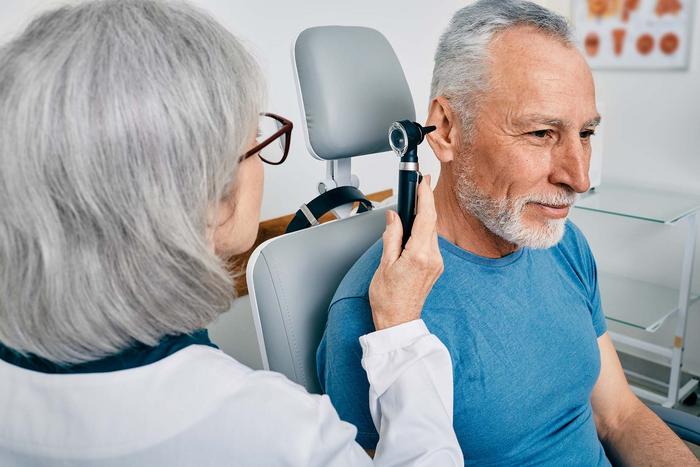Research conducted by Lancaster University reveals a compelling link between hearing impairment and an increased risk of developing Parkinson’s disease, raising critical questions about the relationship between sensory decline and neurodegenerative disorders. This groundbreaking study is one of the first to examine whether deficiencies in hearing could potentially serve as precursors to Parkinson’s or even heighten the risk of its development. As sensory impairments continue to garner attention in various fields of medical research, this study adds an important dimension to our understanding of Parkinson’s disease, which is recognized as the fastest-growing neurological condition globally.
The research, titled “Speech-in-noise hearing impairment is associated with increased risk of Parkinson’s: A UK Biobank Analysis,” scrutinizes data drawn from the UK Biobank, a comprehensive biomedical database consisting of health data from approximately half a million participants across the United Kingdom. Specifically, the researchers focused on a cohort of 159,395 individuals who had completed hearing tests prior to being diagnosed with Parkinson’s. These tests measured participants’ ability to discern speech in environments characterized by background noise, a common challenge faced by those experiencing hearing loss.
Over a lengthy average follow-up period of more than 14 years, the study found that out of the participants, 810 were ultimately diagnosed with Parkinson’s disease. The findings are both startling and significant: for each 10-decibel increase in baseline hearing impairment, there was a corresponding 57% increase in the risk of developing Parkinson’s. These statistics not only highlight the potential implications of hearing loss but also suggest that auditory health could provide critical insights in understanding the onset of Parkinson’s.
Dr. Megan Readman, the lead author of the study and an ESRC Post Doctoral Research Fellow in the Department of Psychology at Lancaster University, underscored the importance of these findings. She articulated that this research represents a vital step in exploring the connection between auditory health and Parkinson’s risk. The implications are extensive; if hearing impairments indeed correlate with Parkinson’s disease, it could illuminate new pathways for diagnosis and treatment in patients who exhibit early signs of auditory decline.
Despite the compelling data, Dr. Readman emphasized the necessity of caution regarding the interpretations of the findings. The research does not definitively establish causality between hearing loss and Parkinson’s disease. Instead, the possibility exists that both conditions may stem from a common underlying factor. This assertion invites further exploration into whether mitigating hearing loss could serve as a protective factor against the progression of neurodegenerative diseases.
The collaborative research team, which included not just Dr. Readman but also experts such as Yang Wang, Fang Wan, Sally Linkenauger, Trevor Crawford, and Christopher Plack, considered these results against the framework of existing medical knowledge. The understanding that hearing loss can indicate several disorders underlines the critical need for a multidisciplinary approach in evaluating overall patient health. As Professor Plack noted, hearing loss may not be an isolated health issue; rather, it may serve as a signal pointing towards broader neurodegenerative challenges.
Moreover, the study’s findings provoke thought regarding auditory function in the context of Parkinson’s disease management. If hearing loss is intricately related to Parkinson’s, it may warrant more attention in standard diagnostic practices and treatment plans for individuals diagnosed with the condition. This paradigm shift in understanding highlights the relevance of addressing auditory functioning, potentially enhancing the quality of life and independence for affected individuals.
A notable aspect of this research is its potential to inspire changes in clinical practices related to patient care. When healthcare professionals acknowledge and address hearing impairments, specifically in older populations, they may contribute to better outcomes for those at risk of neurodegenerative disorders. The study suggests that an integrative approach focusing on both auditory and neurological health could open new doors in prevention and care methodologies.
By identifying sensory impairment as a possible indicator of increased susceptibility to Parkinson’s, researchers hope to pave the way for innovative strategies in preventing and managing the disease. Recognizing hearing loss in the context of neurodegenerative diseases could lead to early intervention programs that might alleviate risk factors before the onset of the disease.
The implications of this groundbreaking research extend beyond academic discussion, raising public awareness regarding the interconnections between sensory health and neurological conditions. With reports from organizations such as Parkinson’s UK placing the number of individuals living with Parkinson’s disease in the UK at a staggering 153,000, the urgency to explore new research avenues is undeniable. An estimated 1 in 37 UK citizens could be diagnosed with the condition in their lifetime, thereby amplifying the importance of comprehensive health assessments that incorporate sensory evaluations.
This extensive study adds vital knowledge to the discourse surrounding neurodegenerative disorders. The findings not only highlight the intrinsic relationship between hearing loss and Parkinson’s disease but call into question the need for continuous research in this critical area. So far, the limitations of understanding remain, as it is evident that the connection between auditory health and neurodegenerative processes requires extensive examination to unravel the underlying mechanisms driving this phenomenon.
In conclusion, the study from Lancaster University marks a significant contribution to understanding the multi-faceted nature of Parkinson’s disease and raises attention to the necessity of incorporating auditory health into broader health management strategies. Comprehensive research in this area holds the potential to enhance diagnostic processes, create impactful treatment protocols, and ultimately improve the quality of life for individuals engaged in the long battle against neurodegeneration.
—
Subject of Research: People
Article Title: Speech-in-noise hearing impairment is associated with increased risk of Parkinson’s: A UK biobank analysis
News Publication Date: 26-Nov-2024
Web References:
References:
Image Credits: Credit: Lancaster University
Keywords: Hearing loss, Parkinson’s disease, neurodegenerative disorders, sensory impairments, auditory function, risk factors, patient care, prevention strategies, UK Biobank.




